Figuring out the cost to install a pool fence can feel a bit tricky. For most projects, you can expect the pool fence installation cost to land somewhere between $1,500 and $10,000, with the average homeowner spending about $4,000. But that wide range tells you there's more to the story.
The final price depends heavily on the materials you pick, the size of your pool area, and how complex the job is.
Decoding Your Pool Fence Project Budget
When you start planning for a new pool fence, it's natural to want a simple price per foot. The reality is a lot more nuanced—think of it like building a custom deck, where the type of wood and the complexity of the design can completely change the final bill. A simple rectangular fence on a flat, grassy yard is going to have a different price than a custom-curved fence that has to navigate hills, trees, and existing patio pavers.
Getting a handle on the key variables from the get-go will help you set a realistic budget. A few main factors will shape what you end up paying:
- Fence Material: This is the biggest piece of the puzzle. Your options run the gamut from mesh to stunning (and pricey) glass panels.
- Total Linear Footage: It's simple math—the bigger your pool area, the more fencing material and labor you'll need.
- Gate Systems: Most local codes require self-closing, self-latching gates, and these specialized systems add to the total cost.
- Installation Complexity: The unique layout of your backyard matters. Sloped terrain, existing concrete, or tricky landscaping features will increase the labor charges.
Let's start with a quick overview of what you can expect to pay for different types of fencing. The table below gives you a ballpark idea of the costs for a standard 100-linear-foot installation.
Estimated Pool Fence Installation Cost at a Glance
| Fence Material | Average Material Cost per Foot | Estimated Total Installation Cost |
|---|---|---|
| Mesh | $7 – $10 | $1,500 – $3,000 |
| Wood | $10 – $30 | $2,000 – $4,500 |
| Vinyl | $15 – $40 | $3,000 – $6,000 |
| Wrought Iron | $30 – $50 | $4,000 – $8,000 |
| Aluminum | $30 – $60 | $4,500 – $8,500 |
| Glass | $100 – $600 | $10,000 – $25,000+ |
As you can see, the material you choose makes a huge difference. While these numbers are a great starting point, keep in mind that your final quote will be tailored to your specific yard and needs.
Understanding the Price Spectrum
The cost of installing a pool fence can swing dramatically based on those key factors—material, size, and how tricky the installation is. We've seen a growing trend in recent years where homeowners are opting for high-end materials like tempered glass, which can run anywhere from $100 to $600 per linear foot. On the other end of the spectrum, you have highly effective options like mesh fencing, which costs just $7 to $10 per foot for the material itself. This huge gap is exactly why a one-size-fits-all estimate just doesn't work.
Think of your pool fence cost as an equation. The material you choose is your base number, but the length of the fence, the terrain of your yard, and the number of gates you need are all multipliers that determine the final sum.
At the end of the day, the goal is to find the right balance between your budget and the fence's primary job: keeping your loved ones safe. A well-planned installation isn't just an expense; it's a critical investment in safety. Making sure your project meets all local codes is non-negotiable, and understanding how to keep your children safe with pool gates and fences is the most important part of the entire process.
In the next sections, we’ll break down each of these cost factors in more detail, giving you the clarity you need to plan your project with confidence.
How Material Choices Influence Your Budget
When you’re planning a pool fence, the material you pick is the single biggest factor that will shape your final pool fence installation cost. It’s a lot like choosing new floors for your house—you could go with basic vinyl that gets the job done, or you could opt for imported hardwood that offers a totally different look and lasts a lifetime, but at a higher price. The same logic applies here. Each fencing material strikes its own balance between looks, durability, and what you’ll pay upfront.
This infographic gives a great visual breakdown of what goes into the total cost of any pool fence project.
As you can see, the three big pieces of the puzzle are the material, the size of the fence, and the gate systems you choose. Let's dig into the most common materials to see how they stack up.
Exploring Common Pool Fence Materials
Mesh Fencing
Mesh has become a go-to choice for a lot of homeowners, mostly because it’s great for safety but doesn’t block your view. This lightweight, see-through material creates a solid barrier without making your yard feel closed in. A huge plus is that it's often removable, giving you the flexibility to take it down for parties or events. When it comes to price, you can expect to pay between $17 to $35 per linear foot for mesh, installed.
Aluminum Fencing
If you’re after a classic look that’s built to last, aluminum is a fantastic option. It’s tough against rust and corrosion, which makes it a great choice that handles the elements without any fuss. Aluminum fences are available in all sorts of styles and heights, giving you a clean, elegant look that works well with most homes. The initial cost is typically a step up from mesh.
Glass Panel Fencing
For a truly high-end, modern look, nothing beats glass panel fencing. It gives you a completely seamless view of your pool area, creating a sleek and secure barrier that’s visually stunning. Made from tempered safety glass, this option is at the top of the price range. The cost reflects the specialized materials and the expert precision needed to get the installation just right.
Think of your material choice as a long-term investment. One option might have a lower initial price, but another could offer better durability and less upkeep, saving you money and headaches down the road.
Durability and Long-Term Value
The material you choose does more than set the initial price—it also determines how long the fence will last and how much work you’ll have to put into maintaining it. For example, aluminum’s rust-proof nature means you won't be spending your weekends sanding down spots and repainting.
Here’s a quick rundown of how different materials compare over time:
- Wood: It has a classic, natural appeal, but it needs regular sealing or staining to keep rot and warping at bay. Those maintenance costs add up over the years.
- Vinyl: A very popular option that won’t rust or rot. Its downside is that it can be more prone to cracking from a hard impact, especially in extreme weather.
- Aluminum & Glass: While they cost more to install, these materials usually just need an occasional cleaning. That saves you a ton of time and money in the long run.
Figuring out these trade-offs is key to making a smart decision. To get a better handle on what makes a fence truly reliable, check out these 5 key features to look for in high-quality security fencing. It’ll help you find the right balance between your budget and your long-term goals.
Understanding Professional Installation and Labor Costs
The materials for your new pool fence are just one piece of the puzzle. The other major factor in your pool fence installation cost is the labor itself—the specialized skill and equipment needed to build a secure, long-lasting barrier. This isn't just about digging a few holes and putting up posts; it’s a job that demands precision and a deep understanding of safety.
Professional installers are your best bet for making sure every detail meets strict local safety codes. These aren't just suggestions—they're rules that dictate everything from how high the fence needs to be to the spacing between the pickets and how the gate latches. Getting it wrong can mean a failed inspection and having to tear it all down and start over. That’s why a pro’s knowledge is so valuable here.
Factors That Shape Labor Charges
Just like no two swimming pools are exactly alike, no two backyards are either. The unique layout of your property will directly impact the time and effort your installation takes. Think of it like paving a driveway: a perfectly flat, straight shot is a lot simpler and faster than a winding path on a steep hill.
Several site-specific conditions can nudge the labor cost up or down:
- Complex Terrain: Sloped yards, hills, or multi-level patios need extra work to keep the fence level and secure.
- Irregular Layouts: A free-form pool with lots of curves requires more precise measurements, more custom cuts, and more posts than a simple rectangle.
- Surface Material: What are they digging into? Soft soil is one thing, but drilling through concrete, pavers, or stone is a whole different ballgame. That requires specialized core drilling equipment and takes a lot more time.
- Site Preparation: If the area needs to be graded, or if the crew has to clear out bushes and other obstacles first, that extra prep work will add to the project's timeline and cost.
Professional installation is a critical safety investment. It guarantees that the fence not only looks right but functions correctly, providing a reliable barrier that adheres to all legal requirements for pool safety.
The Value of Professional Expertise
Hiring a pro does more than just save you a weekend of back-breaking work. It gives you the peace of mind that the job was done right from the very beginning. Installers use commercial-grade tools to ensure posts are set at the perfect depth and tensioned correctly, which is absolutely essential for the fence's stability down the road.
This kind of detail-oriented work prevents common DIY mistakes, like sagging fence lines or gates that don't latch securely—both of which could seriously compromise safety. It's the same reason you'd hire an expert for other critical home projects. In fact, you can see how specialized knowledge pays off by reading about the top reasons to invest in professional gate services, where expertise ensures both security and lasting performance.
At the end of the day, paying for professional labor isn't just a cost; it’s an investment in the safety, compliance, and durability of your pool fence.
Of course. Here is the rewritten section, crafted to sound completely human-written and natural, following the provided style guide.
Navigating Permits and Other Project Expenses
When you're budgeting for a pool fence, it's easy to focus on just materials and labor. But like buying a car, the sticker price is just the starting point. You still have to account for the "extras"—the necessary add-ons that are vital for safety, compliance, and a smooth installation.
One of the most important components is the gate system. Local building codes almost universally require self-closing and self-latching gates for a reason: they keep kids safe by preventing accidental entry. A basic, compliant gate adds a few hundred dollars to your project, but many homeowners choose to upgrade the hardware. High-end magnetic latches or key-lockable systems offer better reliability and can add $300 to $500 or more per gate. On top of that, many areas now mandate audible gate alarms, adding another layer of both safety and expense.
Understanding Permits and Compliance Fees
Before any work can start, you'll almost certainly need to get a building permit from your city or county. This is a non-negotiable step. It’s how your local government ensures your fence meets all the legal safety standards for height, gate operation, and placement. The cost of a permit can vary wildly depending on where you live, usually ranging from $50 to over $500.
Getting the permit typically involves submitting detailed plans of your fence layout. This process confirms your design follows local zoning laws and safety rules. Skipping this step is a huge risk—it can lead to big fines and even an order to tear down the fence, so be sure to factor this into your budget.
Pool safety is a growing priority, and you can see it in the market trends. The global pool fence market, valued at around $500 million in 2025, is expected to grow significantly, thanks to stricter building codes and more people owning pools. You can read more about the growth of the pool protection fence market to get a sense of where the industry is heading.
Accounting for Site-Specific Expenses
Finally, there are the "hidden" costs that are easy to overlook until your installer points them out. These are the variables unique to your property that a professional will spot during a site assessment.
- Land Surveys: If you’re not 100% sure where your property lines are, you might need a land survey. This ensures the fence is built squarely on your land and avoids any future disputes with neighbors.
- Site Preparation: Is the fence line running through thick bushes or over a sloped yard? Clearing out landscaping or doing some minor grading will add to the labor bill.
- Debris Removal: After the job is done—especially if your installer had to core drill through concrete—there will be debris to haul away. This cleanup service is often an itemized charge on the final invoice.
By thinking ahead about these extra costs, from gates and permits to site prep, you can put together a complete and realistic budget without any last-minute surprises.
The True Value of a Professional Pool Fence
It’s easy to look at the pool fence installation cost and see it as just another expense. But that misses the big picture. Think of it more as a long-term investment in safety, property value, and most importantly, your peace of mind.
A professionally installed, high-quality fence is so much more than a mandatory barrier. It’s the single most critical safety system for your entire backyard oasis.
This investment provides a constant, reliable layer of protection that lets your family enjoy the pool with total confidence. Honestly, you can't put a price on the security that comes from knowing children and pets are protected from accidental entry.
Enhancing Property Value and Appeal
A pool fence doesn't have to be purely functional, either. The right design can seriously boost your property's aesthetic appeal and marketability. Modern materials, like sleek aluminum or elegant glass panels, can completely transform the look of your backyard, turning a simple safety feature into a real design statement.
This visual upgrade can translate directly into higher property value. When it’s time to sell, a beautiful, compliant pool fence is a major selling point for potential buyers, especially those with families. It tells them right away that the property is well-maintained and that safety was a top priority. For more on this, you can learn about the role of fence installation in enhancing outdoor aesthetics and how it impacts your home's curb appeal.
A well-chosen pool fence functions as both a shield and a statement piece. It secures the pool area while simultaneously elevating the property's design, making it a dual-purpose upgrade that adds tangible value.
Financial and Insurance Benefits
The impact of a pool fence goes beyond its initial installation cost. A proper barrier is a crucial safety measure, especially when you consider the U.S. has over 10.7 million swimming pools and sees hundreds of preventable drownings each year.
Beyond the obvious safety benefits, a compliant fence can also help your bottom line. Many homeowner's insurance providers see a professionally installed pool fence as a significant risk-reduction measure. Because of this, they may offer reduced premiums to homeowners who have one.
This potential drop in insurance costs helps offset the initial investment over time, reinforcing the fence's value from multiple angles. It proves that a good fence is more than just a line item on a budget—it's a smart financial move.
Answering Your Top Questions About Pool Fence Costs
As you start digging into the details of a pool fence project, a few common questions always seem to pop up. It's one thing to research materials, but it's another to figure out how the specifics of your pool will affect the final bill. Let's clear up some of the most frequent queries homeowners have.
Think of this as the practical side of planning—moving beyond the general numbers to see how your choices and your property's unique layout come into play.
Does the Shape and Size of My Pool Affect the Fence Cost?
Yes, absolutely. The size of your pool area is the biggest factor because it determines the total linear footage of fencing you'll need. A bigger perimeter simply requires more materials and more labor to install, which drives up the budget.
But the shape is just as critical. A simple rectangle is the most straightforward and cost-effective layout to fence. If you have a free-form pool with lots of curves and odd angles, the job gets a lot more complex for the installation crew. That complexity means more posts, extra material waste from custom cuts, and a lot more labor time—all things that add to the final price tag.
An irregularly shaped pool might require 10-15% more fencing than its direct perimeter measurement suggests. This accounts for the extra material needed to smoothly navigate curves and obstacles while keeping the proper distance from the pool's edge.
Can I Install a Pool Fence Myself to Save Money?
Going the DIY route to save on labor costs is tempting, but it comes with serious risks that can end up costing you a lot more down the road. A pool fence isn’t just for looks; it’s a critical safety system. Local codes are incredibly strict, dictating everything from fence height and gate operation to the exact spacing between the vertical posts.
A shoddy installation can easily fail a safety inspection, forcing you to pay for expensive rework or even a full replacement. Worse yet, a compromised fence might not provide the protection your family needs. Professionals have the specialized tools, like core drills for concrete, and the expertise to guarantee the installation is secure, level, and fully compliant. When safety is the top priority, professional installation is an investment in your family’s well-being.
How Do Gates and Alarms Impact the Total Cost?
Self-closing and self-latching gates are mandatory safety features in most areas, and they’re a separate line item in your project cost. A basic, code-compliant gate will add a few hundred dollars to the total. But the price climbs depending on the quality of the hardware you select.
Upgrading to more dependable magnetic latches and durable, adjustable hinges will cost more upfront but gives you better long-term performance. For instance, a high-quality magnetic latch system can add $300 to $500 to your total. On top of that, many cities now require an audible gate alarm, which adds another layer of safety and another item to your invoice. It's smart to invest in better mechanisms—they ensure reliable safety day in and day out.
What Is the Best Time of Year to Install a Pool Fence?
A little strategic timing can make the entire installation process much smoother. Scheduling your project during the off-season—usually late fall or winter—is often a great move. In the spring and early summer, fencing contractors are slammed with homeowners rushing to get their pools ready for warm weather. That high demand leads to longer wait times and less scheduling flexibility.
Plan your project for the slower months, and you'll find that installers have much more availability. This can lead to a quicker, more streamlined installation from start to finish. Planning ahead not only gets you on the schedule but also makes sure your pool is safe and ready to go long before the first swim of the season.
A secure, professionally installed pool fence is a vital investment in your home's safety and value. The team at Security Door Gate and Fence provides expert installation services to ensure your pool area meets all safety codes with a durable, high-quality barrier. To discuss your project and get a clear, detailed plan, visit us at https://securitygarageandgate.com.


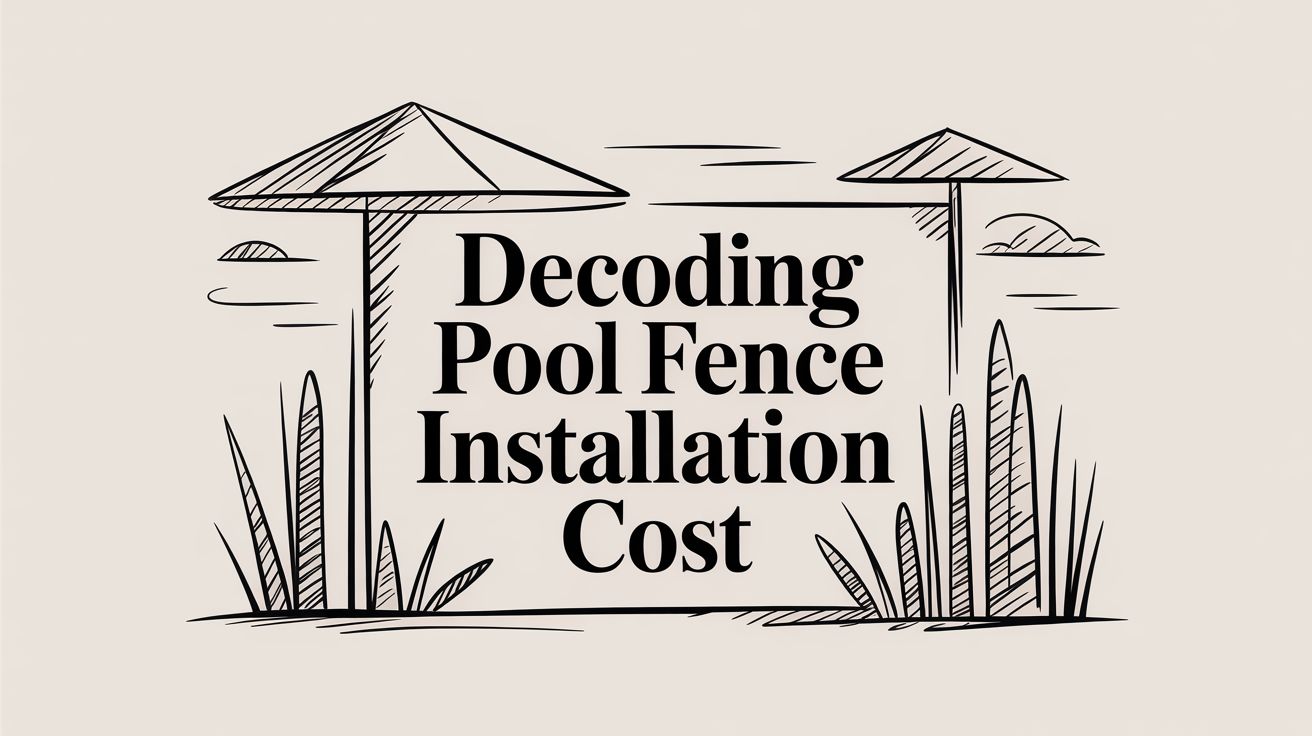
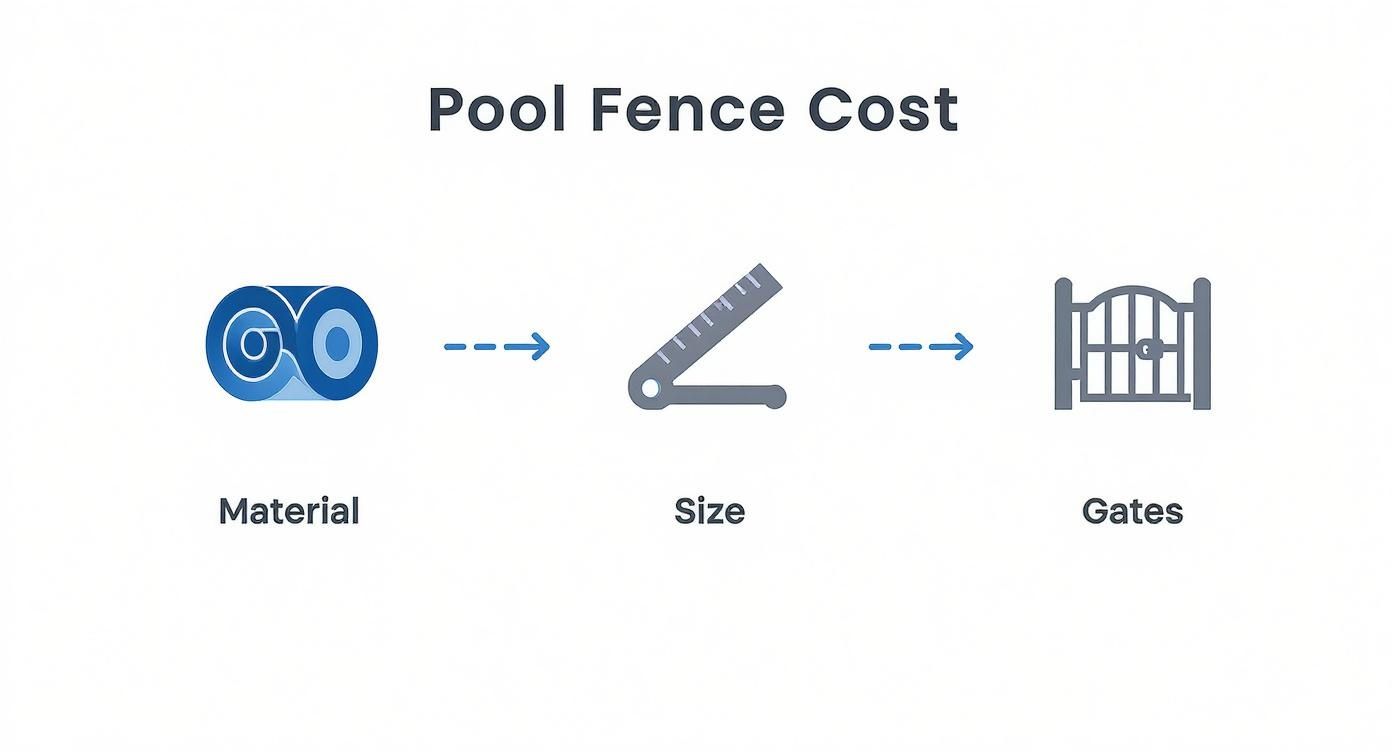
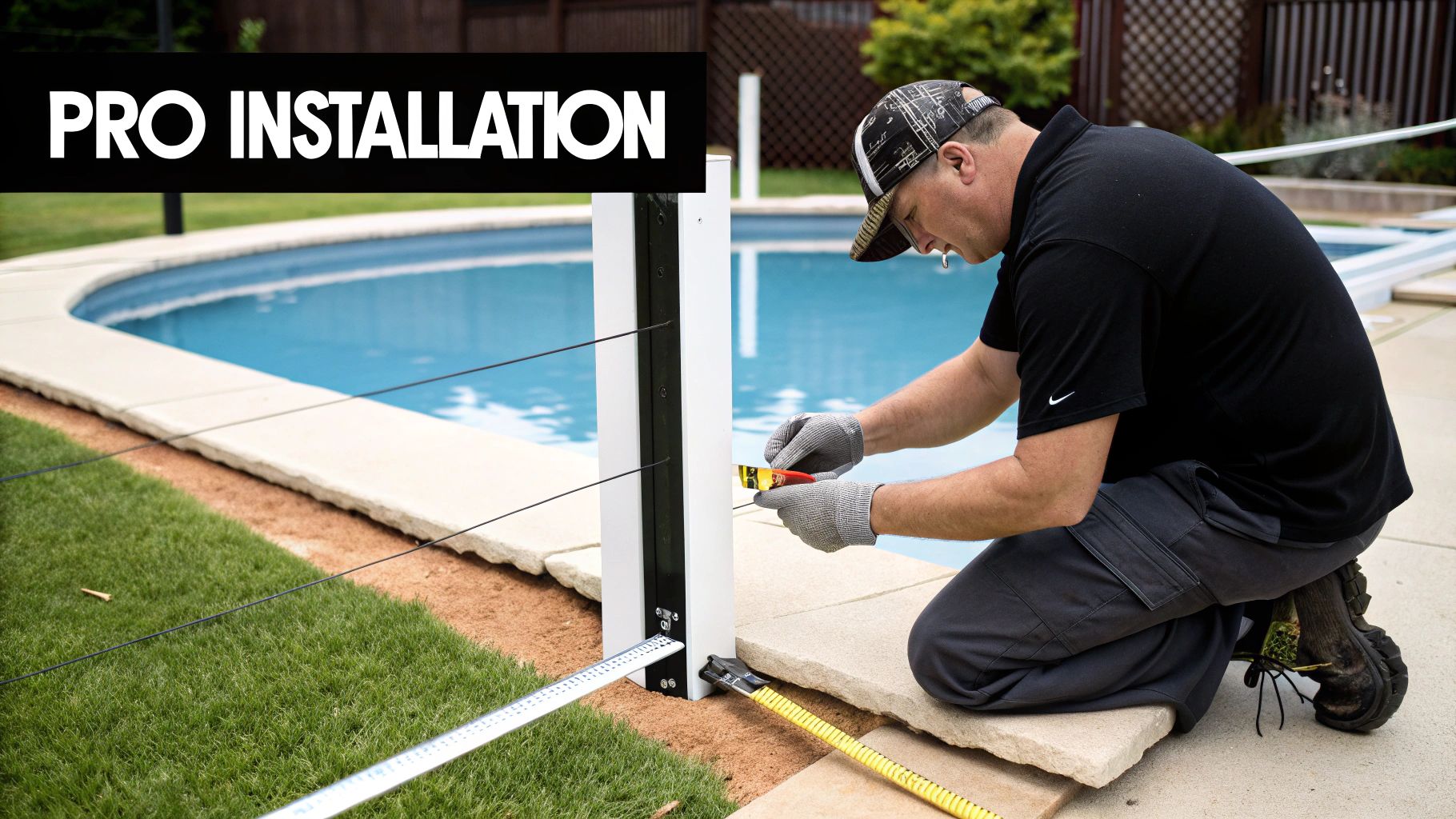
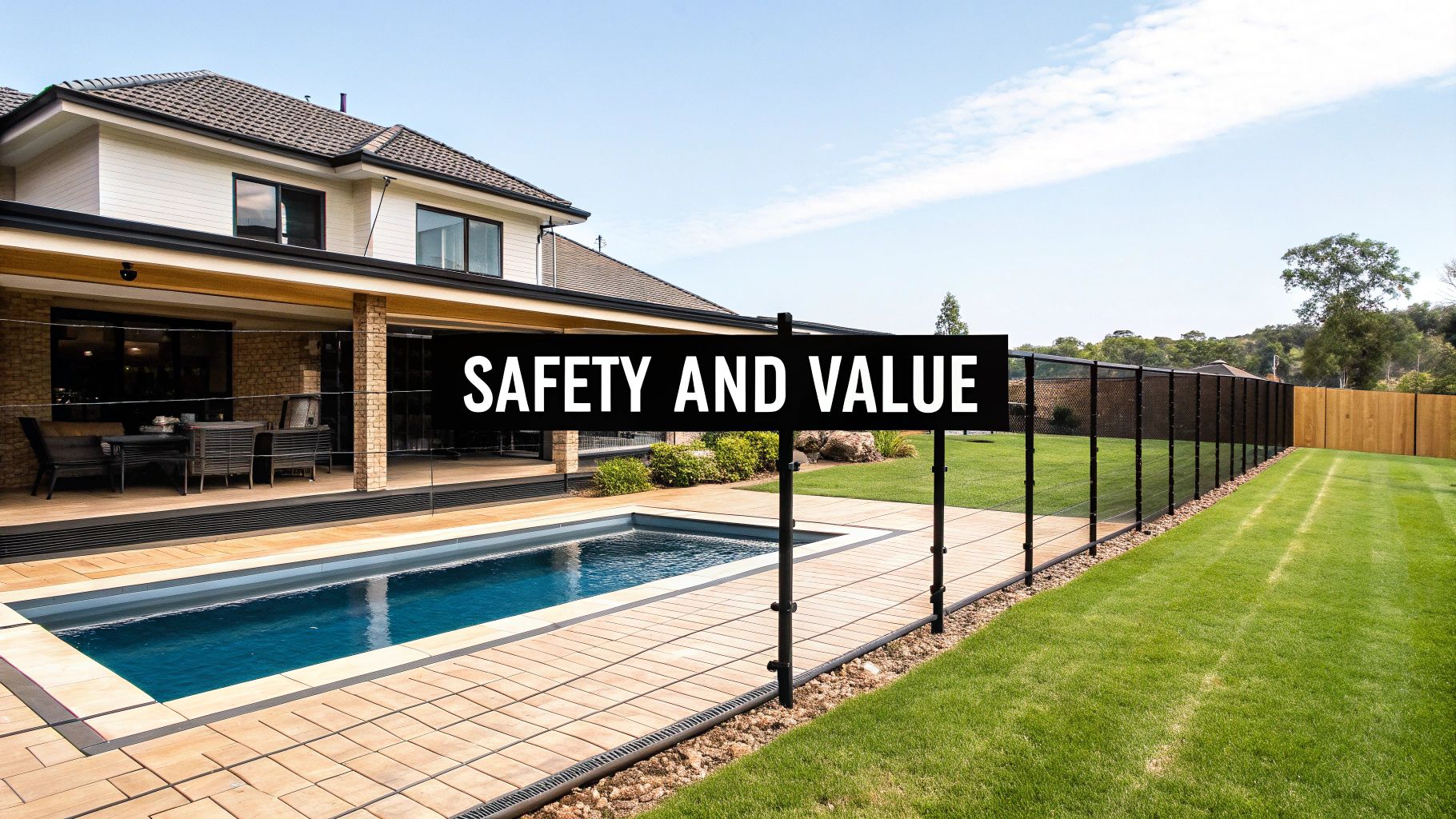

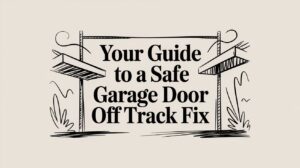


 (480) 548-0807
(480) 548-0807